Heytvelt first drug suspect in program

Prosecutors say Gonzaga University basketball star Josh Heytvelt received no special treatment.
But it turns out Heytvelt is the only felony drug suspect from Spokane County ever approved for enrollment in the diversion program that could eventually clear his name.
Authorities say it’s nothing more than coincidence; plans had been under way to expand eligibility for referral to Friendship Diversion Services prior to Heytvelt’s Feb. 9 arrest in Cheney for possession of hallucinogenic mushrooms.
“We had that in the process,” Deputy Prosecutor Jack Driscoll said, “and lo and behold Mr. Heytvelt gets arrested.”
The deal, which includes dismissing the charges against Heytvelt if he stays out of trouble for a year, was approved this week by Superior Court Judge Michael Price. It was arranged by defense attorney Dennis Thompson and Deputy Prosecutor John Grasso.
The 6-foot-11-inch tall sophomore from Clarkston will be required to submit to random drug testing and complete 240 hours of community service. If he abides by the conditions of the program, his felony charge of possessing a controlled substance will be dismissed.
Up until the Heytvelt case, the diversion program had only been used for suspects charged with property crimes, such as theft or burglary, Driscoll said.
Asked if the 20-year-old Heytvelt is receiving special treatment, Driscoll said no. “It’s just the way the circumstances occurred.”
Barbara Miller, executive director of the Olympia-based Friendship Diversion Services, said Heytvelt most likely will be required to complete an Alcohol/Drug Information School, which is an eight-hour class that teaches the pitfalls of substance abuse.
“Our goal with these defendants is that they leave with more in their toolboxes than when they came so that they are better prepared not to run afoul with the criminal justice system,” Miller said.
If Heytvelt does not follow the provisions of the program, he would face up to six months in jail and a criminal record, Grasso said.
“We are going to learn a lot about this young man’s character in the next few months,” he said. “Whether he succeeds or fails is solely up to him.”
Part of that signed agreement includes a provision that prevents Heytvelt from leaving the state for the year he remains in the diversion program. However, Grasso said that would not prevent Heytvelt from traveling to basketball games if he is reinstated to the team.
“If he has to go to New York City … what he needs to do is bring an order before the court. I certainly would agree to it,” Grasso said.
Thompson, who could not be reached for comment, started working on a deal with Grasso even before laboratory tests confirmed that the mushrooms found in Heytvelt’s SUV were illegal, Grasso said.
“I think it was shortly after the arrest I talked to Dennis,” Grasso said. “This was something they wanted to do from the very beginning. Ultimately, it was my decision, but I talked to Jack Driscoll about it.”
Grasso said he was reluctant to do anything that could detract from cases eligible for Spokane County felony drug court, which is an intensive program designed to get help for drug abusers charged with possession.
However, to become eligible for drug court, a drug evaluation must show the suspect has a significant drug problem, Grasso said. Thompson paid for a drug evaluation of Heytvelt that showed he has no significant problem.
“If you didn’t have a (drug abuse) problem, you … could end up with a felony conviction. So potentially there is an inequity there,” Grasso said. “That’s what took me over the edge. I told Jack, ‘You are right. We should have something for first offenders.’ “
Grasso said defense attorneys for some time had been asking prosecutors to add felony drug possession to the Friendship Diversion program.
“I don’t want there to be an impression that we did this because of Heytvelt,” Grasso said. “That’s absolutely not true. It was just a timing thing.”
Grasso also did not ask Price to make confidential a letter sent to the court by Gonzaga coach Mark Few.
“I thought it was a nice positive letter,” said Grasso, who read the letter after Thompson presented it to Price in chambers on Monday.
“Basically it was … ‘Here are the things Josh has done since he’s been in the program and academically. He potentially has a future in the NBA. We are high on him. We are going to work with him and help him in the future.’ That’s my recollection of what it said.
“It would have had an impact if I hadn’t already decided that diversion was appropriate,” Grasso said.
After the deal Monday, Heytvelt issued a public apology but would not answer questions. Another Gonzaga player, Theo Davis, 21, who was with Heytvelt at the time of the arrest, was expected to plead not guilty this week to a misdemeanor marijuana possession charge in Cheney Municipal Court.
Few’s letter was the only correspondence Grasso had from university officials regarding the Heytvelt case, he said.
“The coaching staff has never contacted me,” he said. “They’ve never asked for anything. I’m sure they just let the system run its normal course.”